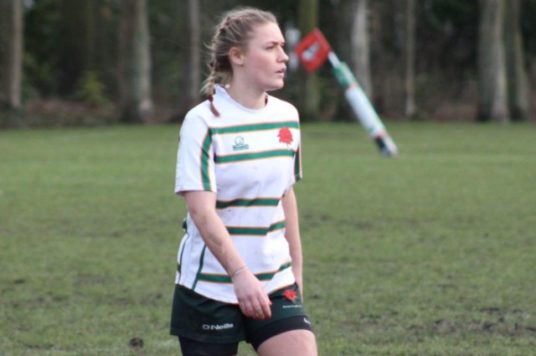Rugby player Ellie rushed to St George’s for treatment following stroke
Ellie Edwards, 21, was rushed to St George’s for an emergency thrombectomy when she had a stroke following a rugby match earlier this year (4 February).
Ellie had played rugby, as she would every Sunday, and was on her way home when she started to feel very dizzy and had difficulty lifting her feet.
She was taken to her local hospital and following scans, it was revealed that she had a blood clot in her brain and was rushed to St George’s for immediate thrombectomy intervention; a surgical procedure to remove the blood clot blocking blood flow to the brain and restore blood flow to the affected area.
Ellie said: “It was really frightening, I didn’t know what was going on. I thought perhaps I was concussed but I hadn’t had any form of injury or head contact during the match, so then I thought maybe I was dehydrated or having a panic attack. I can’t really explain it. I just felt very dizzy and struggled to move or speak.”
After a week in hospital, two months of recovery and a six week phased return to work, Ellie is now back to living her usual life.
Ellie – who no longer plays rugby, but works for Harlequins – is still processing what happened and praised her care team for helping her through her treatment and recovery.
The stroke caused a weakness in her left side, double vision, slurred speech (dysarthria) and swallowing difficulties (dysphagia) and so she required speech, language and physical rehabilitation as well as having a modified diet to enable her to swallow food safely.
Emily Wakefield, Speech and Language Therapist, said: “I work with lots of people who have had strokes – but Ellie is the youngest so far! I’m so pleased to see her recover so well and know that she’s back to her usual self.”
Ellie said: “I don’t remember much, but I remember waking up the next morning after being brought out of an induced coma and being able to talk after not being able to before the thrombectomy – I thought it was a miracle!”
Dr Joe Leyon, Consultant Interventional Neuroradiologist, performed Ellie’s thrombectomy. He said: “Seeing thrombectomy patients – particularly patients like Ellie – recover keeps me in the job that I do. It’s incredibly rewarding to see such remarkable recoveries.”
Dr Val Jones, Consultant Stroke Physician, said: “I was the first person to be contacted about Ellie when she arrived at St George’s. We were really worried she might have got to us too late for treatment, but we wanted to do whatever we could to try and help. I’m so pleased to see how well she’s recovered now.”
She added: “Ellie’s story is a brilliant example of multiple teams working together to benefit the patient. There was involvement from a number of areas including neurology, speech and language therapy, nursing, theatres and anaesthetics.”
Ellie said: “I had the best support around me from the team at St George’s. I’ll be forever thankful to St George’s and I’ll never forget the care I received. It really was amazing!”
Notes to editors
- As the UK’s first hospital to have a 24/7 thrombectomy service, St George’s clinicians are able to treat patients quickly and effectively around the clock, with an 80-90% chance of opening up blocked vessels via this technique, compared to 10% with traditional clot-busting drugs
- St George’s Hyper Acute Stroke Unit treats over 1200 stroke patients each year
- The thrombectomy procedure itself is carried out by interventional neuro-radiologists, with the patient’s before and after care provided by the stroke team
- Thrombectomies have been shown in clinical trials to significantly improve survival and quality of life by restoring blood flow and therefore limiting brain damage.
- For more information, please contact Pippa Harper, Media Manager, on philippa.harper@stgeorges.nhs.uk or 020 8266 6128.


